Election TV debates: The case for and against
- Published
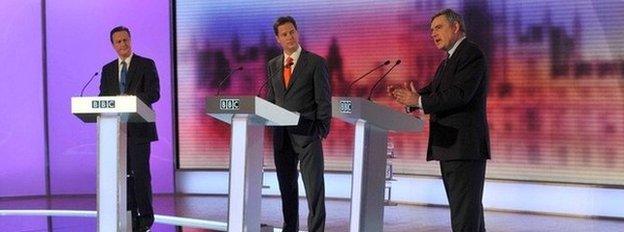
Will 2010's general election debates be repeated?
David Cameron's refusal to join televised election debates unless they include the Green Party has triggered an almighty political row.
With the events now in serious doubt, here are seven reasons they won't happen - and seven more why they still could take place.
Why they won't
1) David Cameron doesn't want to do them, because he has far more to lose than he has to gain
If last time around the first debate led to Cleggmania, there is a fair chance this time it could be Faragemania, or at least so goes the fear among some Conservatives.
And if plenty criticise the Labour leader Ed Miliband for not looking sufficiently prime ministerial, why give him a stage, a podium and the company of a prime minister to help him along?
What are the upsides of turning up if you are David Cameron?
2) Being called "chicken" isn't the worst thing that could happen to the PM
Expect quite a few unflattering comparisons with feathered poultry in the next few days and weeks. But there are worse things to happen to a prime minister than being called "chicken."
Or being followed around by someone dressed as a chicken. Or even have TV reporters flapping their arms around and making clucking noises.
And that is losing. This election looks like it is going to be close. So why risk it?
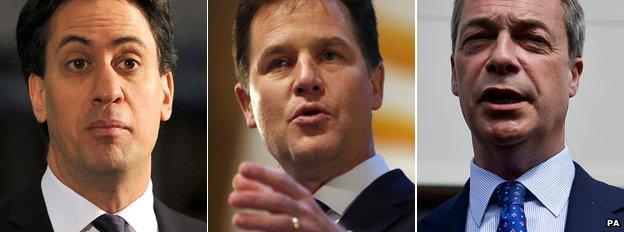
Ed Miliband, Nick Clegg and Nigel Farage could be left debating without David Cameron
3) Watching an empty podium will get boring
The political dictionary is full of horrific abuses of the English language and this debate about debates has added another. Try "empty podiuming" for size.
I did warn you. It is an ugly shorthand which means having a podium in the studio for the prime minister, but with no one standing behind it and then letting the other leaders slug it out between themselves.
The novelty of an upright bit of wood or chrome with no one behind it might wear off over two hours, especially amongst viewers who have thought they would dip in to find out who they would prefer as prime minister, only to discover one of the more likely candidates for the gig isn't there.
4) What would happen to the planned Cameron-Miliband head to head?
Without David Cameron, one of the debates, the planned head to head with Ed Miliband, wouldn't be a debate at all.
It would be Mr Miliband with two podiums for company. His own, and a rather lonely one waiting forlornly for David Cameron.
5) Going ahead with the debates without Mr Cameron would require an outbreak of nerve and steel from the broadcasters
Would they have the guts, on three separate occasions, to leave the sitting prime minister out? Of course they should, scream Labour, the Liberal Democrats and UKIP - they are independent, and they must, if he refuses to turn up.
It sounds a laudable principle, but it would be quite a thing for the TV companies to actually do in the heat of a very close election campaign.
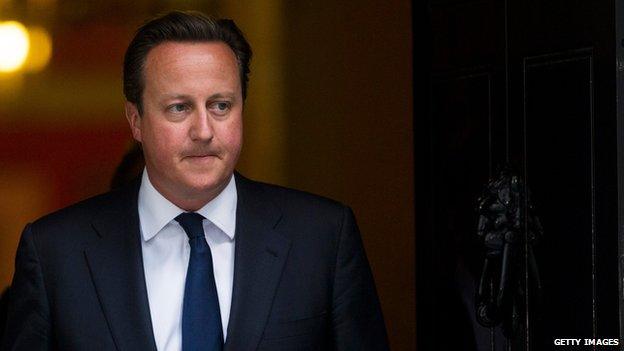
David Cameron wants the Green Party included in the debates
6) Never mind an outbreak of nerve and steel. What about the law?
And even if the Green Party is accommodated as the prime minister claims he wants, what then about the Scottish National Party? The third biggest political party in the UK by party members already has twice as many MPs as UKIP and the Greens put together.
But if you do include the SNP, what about the Welsh nationalists Plaid Cymru? And the parties from Northern Ireland. Suddenly the debate is looking rather unwieldy, and maybe some distance short of gripping telly.
7) Why should the debates go ahead anyway?
Hello, it's January. There ain't much time left. At every other election apart from 2010, debates didn't happen, for the very reason they might not this time: the party leader with the most to lose decided against it.
So history suggests last time was the exception, not some guaranteed new pattern for the future.
And why they will
1) No-one likes a "reverse ferret"
Lots of apparently clever people for lots of different reasons want them to happen and are working hard to make sure they do.
Channel 4 and Sky are planning to host a debate between David Cameron and Ed Miliband. The BBC is planning a debate involving Messrs Cameron and Miliband, with Nick Clegg for company too. And ITV will have four podiums, to make space for Nigel Farage as well.
So for the debates or any debate not to happen, a lot of reverse ferreting has to happen. Is "reverse ferreting" worse than "empty podiuming?" Maybe.
2) Don't forget digital
A long time ago telly used to be about the BBC. Then ITV came along. Then Channel 4. And then Sky. That foursome are the broadcasting collaboration hoping to pull off these debates.
But telly is a bit more democratic these days. The newspapers are in on the act, and so is a big internet outfit. Enter the Digital Debate Campaign, external.
The Telegraph, The Guardian and YouTube have come together to stage their own debate - and they have already invited the Green Party.
The campaign says the other parties have expressed an interest, but have not formally replied.
The digitalistas are also offering their debate to any TV channel that wants to broadcast it - so bingo, there could be a TV debate after all even if the ones the broadcasters want to stage themselves don't come off.
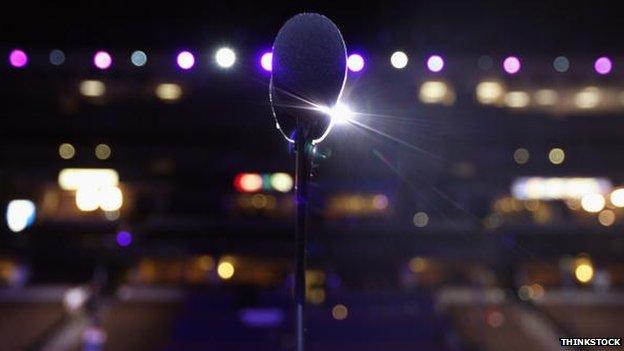
David Cameron's rivals say he should be "empty podiumed" if he does not agree to take part
3) The debates could be even more interesting without David Cameron than with him
The sitting Prime Minister of the day being visibly humiliated in front of millions by not being there?
Surely for at least one broadcaster, or the digitalistas, that would be a tantalising prospect, cracking telly?
4) "Chicken" name-calling could come home to roost
Let's have a look at the other end of the chicken, so to speak.
A new ComRes poll for ITV News suggests the majority, external of Britons, 55%, think that David Cameron is a coward for trying to avoid TV debates with the other leaders. Only 23% disagree.
And half of us, the poll suggests, think Mr Cameron is just using the Green Party as an excuse to avoid the debates.
So a leader who tends to outpoll his party in popularity and contrasts his strength as a leader with Ed Miliband, is seen as a chicken by plenty of the electorate, it would seem.
How does that look in Downing Street?
There are (at least) six parties that want the debates to happen: Labour, the Liberal Democrats, UKIP, the SNP, Plaid and the Greens.
A noisy ensemble, then, of pretty much every other political party, shouting loudly, saying a variation of "get on with it." The Liberal Democrats are the latest to set up a petition.
How often do you have to be called a chicken before it becomes dangerous?
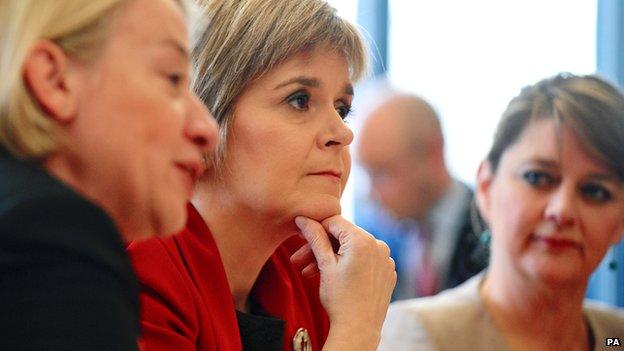
Natalie Bennett (Green Party), Nicola Sturgeon (SNP) and Leanne Wood (Plaid Cymru) want to be included in the debates
5) People like the debates
Some 22 million watched at least some or one of the three TV debates before the last election. Political debate was mainstream and the debates helped that to happen.
So 2015 isn't like every other election campaign - because last time there were debates, squashing them is a bigger deal this time.
And all sorts of people thought they were a good idea last time around.
Have a read of this quote: "I think television debates will help engage the public, help answer some of the questions at the heart of the election, will help bring the election alive in some way."
Does that convince you? Well, it convinced David Cameron. In 2010.
6) There is scope for compromise
David Cameron has repeatedly said he wouldn't want all the debates, or perhaps any of them, happening in the mad dash of the last few weeks of the election campaign.
That time should be set aside for dashing around madly, not sweating in TV studios. But the broadcasters and the digitalistas are flexible about timings. So let's negotiate.
7) Why on earth shouldn't these debates go ahead?
Surely something, on some platform, involving at least some leaders, will be cobbled together?
This is a multimedia era where for at least the third general election in a row pundits will claim this one will be the first truly multiplatform contest.
With an unprecedented cacophony of media voices and a greater range of political parties assumed to be credible and big hitting than ever, it's got to happen.
Hasn't it?